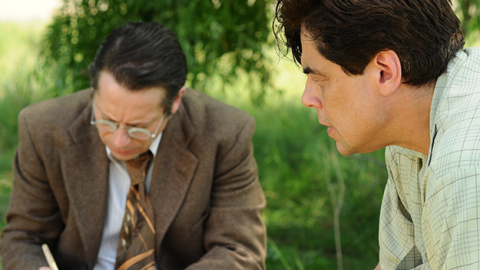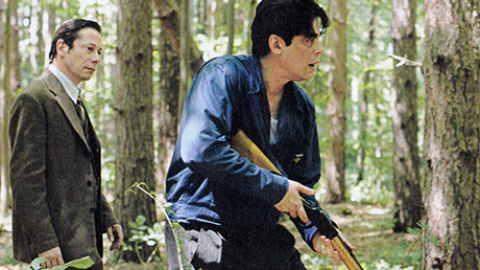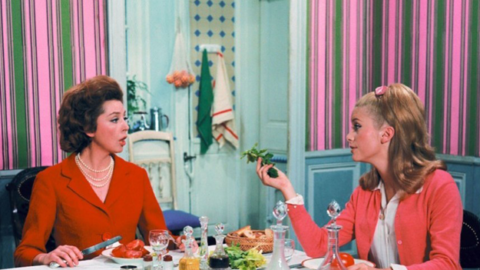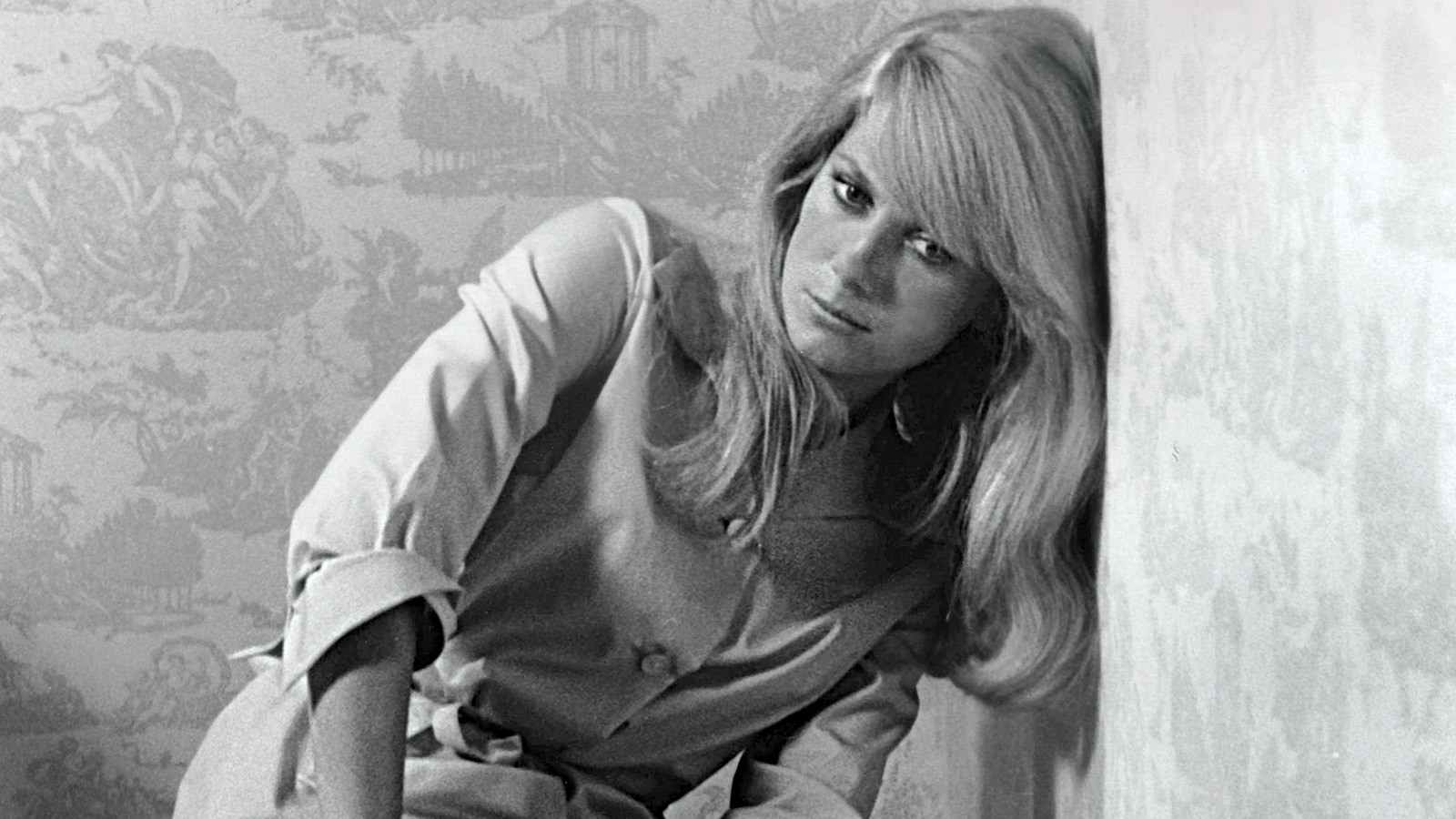
How Does My Queen?
Of course there is her shocking, direct, beauty. Catherine Deneuve is beautiful in a direct way. And because she has carried that dazzling beauty with great serenity. Then there is her audacity—Catherine is audacious! Her speed—she is the fastest actress in the world (she refuses emphasis, stupidity bores her). Her rebellion: never play the games of adults! She once described Mastroianni as “a boy” because he never forgot the child he had been. Because of her rebellion, Catherine is the favorite actress of all French children. Because she is a girl. One of her secrets: never complain, never explain. A queen!
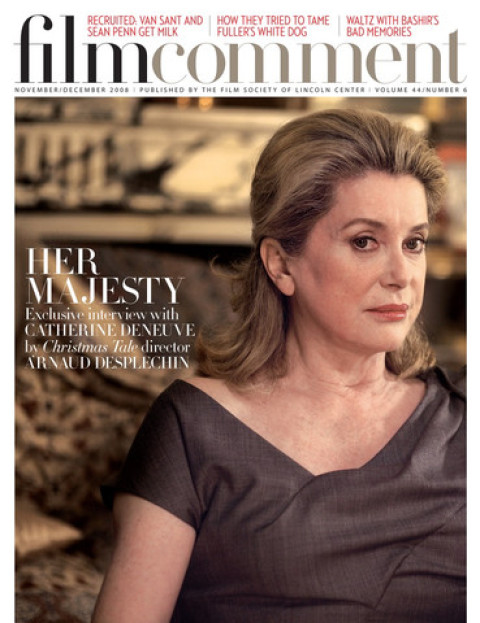
CATHERINE DENEUVE: Is this going to be serious?
ARNAUD DESPLECHIN: It’s for Film Comment. It’s a bit like an American Cahiers du cinema.
I don’t read Les Cahiers; I buy it but I don’t read it. Those magazines are really for people who reflect on cinema, who think cinema. They’re not made for people like me. In truth, I don’t read about films much.
I’ve been reading Les Cahiers since I was 16.
For me there are two things: action and reflection. And I find that I’m more into action. I’m a slow reader, so I would rather spend that time watching a film.
But when you first started out, wasn’t this dream of being in films materialized through conversations? I’m struck by how many people you worked with in your first films are linked to the New Wave: Doniol-Valcroze, Vadim, Delerue, Coutard… Didn’t they love to talk about film?
Yes, but those people were more into joking than talking seriously. They were like me, more into action.
Didn’t you go to the Cinémathèque?
Sometimes. One of the first films I ever went to see was The Naked Jungle. I was so impressed! I was young… It’s about ants that devour everything. It’s a very beautiful film in Technicolor, with Eleanor Parker, a beautiful American redhead, and Charlton Heston. It was an American adventure film with a very far-fetched story. I remember that film because it was one of the first I ever saw—that and The River Girl, with Sophia Loren. You see her in a rice field, a little like Silvana Mangano in Bitter Rice—a beautiful, very realistic film, in which she loses her child… I waited to get a cinephile boyfriend before I started going to the cinema. I didn’t go of my own accord, just because I wanted to…
So you weren’t a cinephile at the time when you made your first films?
Yes, I was, I’d already seen a lot of films. I was very young when I got a boyfriend, so I started watching interesting films at the age of 15, around the time I made Les Portes claquent [60]. Seeing Ivan The Terrible had a tremendous effect on me.
Was that at the Cinémathèque?
No. It was on the Left Bank and for me that was like traveling to a foreign country. Going to a different neighborhood was really…! And because my boyfriend lived on the Left Bank, we went to see it in a theater on Rue de Rennes.
That was the Arlequin, a theater owned by the Communist Party…
Yes, the Arlequin. My boyfriend was quite young, very communist, very conscientious objector, all of those things.
Before that, you didn’t go to the cinema very often?
Very little. We didn’t go out much as a family.
Despite both your parents being actors?
My father was in the theater and was a voiceover artist, but we didn’t live in that milieu at all. My mother brought us up very normally and very seriously, and cinema was not part of our family life.
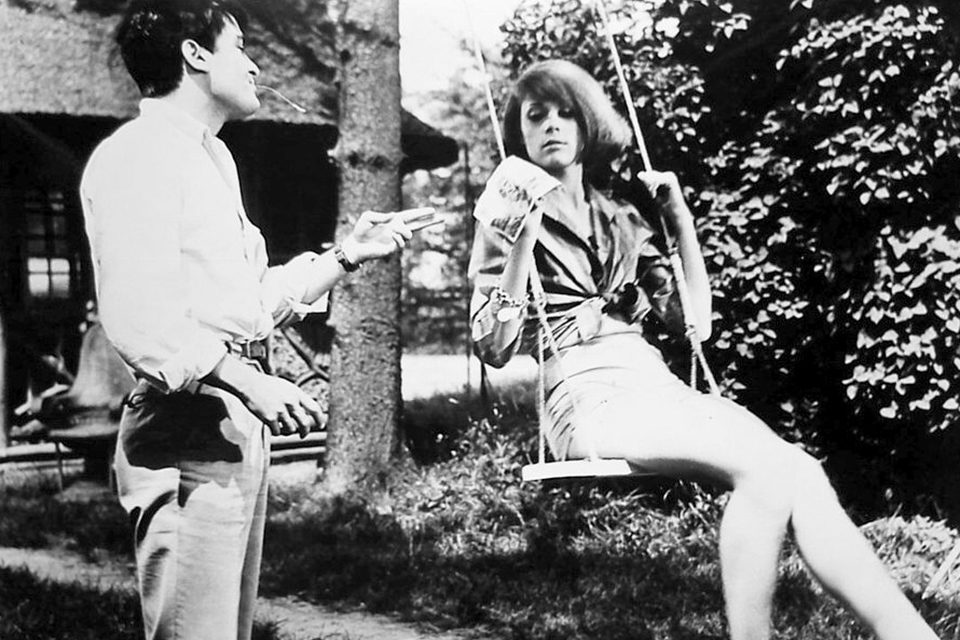
Les Portes claquent
You didn’t go to the theater very often either, did you?
No, almost never. My mother worked in the theater. She was a doyenne at the Odéon before she reached 30! She had started there as a child. And I found out much later that my grandmother was a prompt at the Odéon. Of course I went to see my sister, Françoise Dorléac, when she was in Gigi.
Your two sisters started acting before you…
But my younger sister Sylvie only did it casually. She was in a film called Les Petits chats. A couple of times I was an extra with her. She also had a small part in Les Collégiennes [57]. And because school was out and I wanted to make some pocket money, I appeared in that film too. I must have been 13 at the time.
Who were you more into—actors or directors?
Actors have never had a hold on me, strangely enough—with the exception of Marilyn Monroe. It’s always been the film first. As a teenager, I was not a fan at all, I fell into film by coincidence. My sister was the one who started off working in theater, the classical route. My first ever part was alongside her, with me playing her sister… For that reason I always felt a little bit in the margins, until I met Jacques Demy. That’s when I realized that cinema could be something else, when I started a [professional] relationship with someone who really wanted me, for this particular film: when it stopped being a coincidence. Demy had seen me in a film called Ladies Man [60], with Danielle Darrieux.
He had offered you the part in The Umbrellas of Cherbourg [64] long before the film got made. Filming had to be postponed…
Yes, because I was pregnant.
You had already done the Marc Allégret, but that was a small thing, and then came the Pierre Kast film, Vacances portugaises [63].
Oh, that was a small part. That, to my mind, is the most New Wave film I ever made! There was Doniol-Valcroze, Aptekman, Françoise Arnould, Françoise Brion… That’s when I realized I was pregnant. I must have been only 19.
But it’s only after you made Umbrellas that cinema became your passion?
Yes. I think it being a musical counted for a lot. We made it with very little, and I think that served the film. We had to be very, very resourceful. I ended up spending a lot of time with Jacques. I was present at all the recordings. After that, I worked with the film score. And then I was pregnant, so he postponed filming. We shot that film two months after I had given birth.
Beyond the work of an actress, you were around for a lot of the directing…
Absolutely, because the preparation truly counted for half of the film. It was a film that existed before it was even shot. I remember that when we heard the music, we were all incredibly moved, even though there were no images yet. Jacques was very demanding but also very shy, and he liked to laugh. I recognized myself completely in his way of working. The making of the film was pretty nonsensical and I found that very attractive: everything seemed extraordinary. And I think that I felt that he regarded me as indispensable. I realized that cinema had the potential to be like that: meetings between people who want to do very unusual things. If the film hadn’t done well, I think it would have been a different story—it confirmed that the most important thing was to do the things you want to do with people you trust and whose ideas don’t seem too conventional to you. For me, something truly shifted when I worked with Jacques. Something profound happened around the relationship you can have with a film.
Do you know what you would have wanted to do if it hadn’t worked out this way?
I probably wouldn’t have done anything at all. I would have married my boyfriend, who had gone to war in Algeria, had children, and been divorced three years later, that’s for sure! I think I would have liked to be an architect. Yes, things that later I wished my children would be. Archaeologist—obviously, that has nothing to do with being an actress! To me it’s absolutely fascinating, so I tried to push them… Particularly my son, who was very meticulous, very neat. My daughter says, “You tried with me, but not for long.” It’s true that with Chiara, it was harder. That would have made me happy: anthropologist, or architect. [She thinks some more and then bursts out laughing.]
I am deeply moved by that film. Often, in cinema, a character only earns the right to be a hero if his or her feelings are absolute. Trivial feelings must be kept hidden. I am thrilled that nothing about Geneviève is hidden. She’s pregnant, she’s young, she hates her lover because she’s bored. It’s the trivial nature of her emotions that astounds me. Another actress and another director would have demanded of the character that she prove her “absolute” to the audience. To me she proves her “relative,” and that is much more moving.
That’s Demy all over! It’s a whole way of filming, like gazing at the situation from a particular height.
The Umbrellas of Cherbourg
How do you think Kazan would have filmed this trivial—but not idiotic—heroine?
Funny you should mention Kazan because when I saw Umbrellas again a few years ago, it struck me: it’s exactly the same ending as in Splendor in the Grass. I adore that film. It’s one of the most beautiful love stories I’ve ever seen in the cinema. And the end scene is exactly the same as in Umbrellas. He is on the farm, with his dungarees, his wife, the child and she comes back… It was so moving to see that resemblance. I think it is one of the maddest, most audacious films on the subject of love. Particularly for a man to bring a young woman to life in such a way! Splendor in the Grass is so much about unbridled love. The idea that loving can make you insane. That is what happens: you become insane! To know how to give that, to make actors play like that. And she is a very young woman! Going as far as to see her leave for the hospital, because she is dying of love, she wants to die! That film knocked me over.
Geneviève is also very young in Umbrellas.
Yes, and that is enough. Both of them are very young.
A lot of the things we do when we are young—like Kazan’s characters or those in Umbrellas—we do by coincidence, or for trivial reasons…
Of course…
But it’s the re-capturing of all that, the meaning you give it with time, how you use it and how you transform trivial choices into an artistic choice.
Yes, I wholeheartedly agree.
When I consider all your films, I see a unique quality that I don’t see in other actors. What I see is the mark of an auteur. Beyond the excellence of your acting, what all your films seem to share, is your gaze, your point of view.
Yes, you’re right, that’s what it is: a gaze. I think I’ve always leaned toward that. Perhaps because I never went to acting school and never worked with actors. I only ever met them on film sets—I never really had any actor friends, apart from my sister. I was always on the director’s side, or the screenwriter’s. I didn’t choose to, it just happened.
You spoke earlier about your passion for Marilyn. Later, you dyed your hair blonde and that gesture fascinates me.
That was a gesture of love.
There is, in that gesture, an ambiguity. Was it a Monroe-like rebellion, a dream à la Demy or a Hitchcockian classicism? Just like the question that a young filmmaker might ask himself: what is the point of cinema?
Cinema helped me grow up, that’s for sure. I was really very ignorant of a lot of things. It’s hard to imagine how being part of a large family changes your relationship to the world outside. Because a large family is at the same time very protective and very closed. It’s when I realized this that I got the longing to leave. I found it a little worrying, so I left home when I was quite young.
You dyed your hair out of love, as an affirmation. In the same way you also chose a name, your mother’s name.
It was impossible for me to have the same name as my sister Françoise. Or at least, that’s what my family said at the time. Françoise had studied at the Conservatoire, she worked in theater. And me, I wasn’t even sure that I’d continue acting. For that first film, my parents suggested my mother’s name. If I had to do it again, I wouldn’t make that decision! I love my mother dearly but I don’t like her maiden name. It’s hard to pronounce. I prefer my real name.
I interpreted it as a declaration of independence.
I didn’t make it up! My mother said, “You’re going to take my maiden name”. I said, “Yes, okay.” I didn’t see it as a permanent thing. I didn’t think I would keep working in film. My head was completely elsewhere.
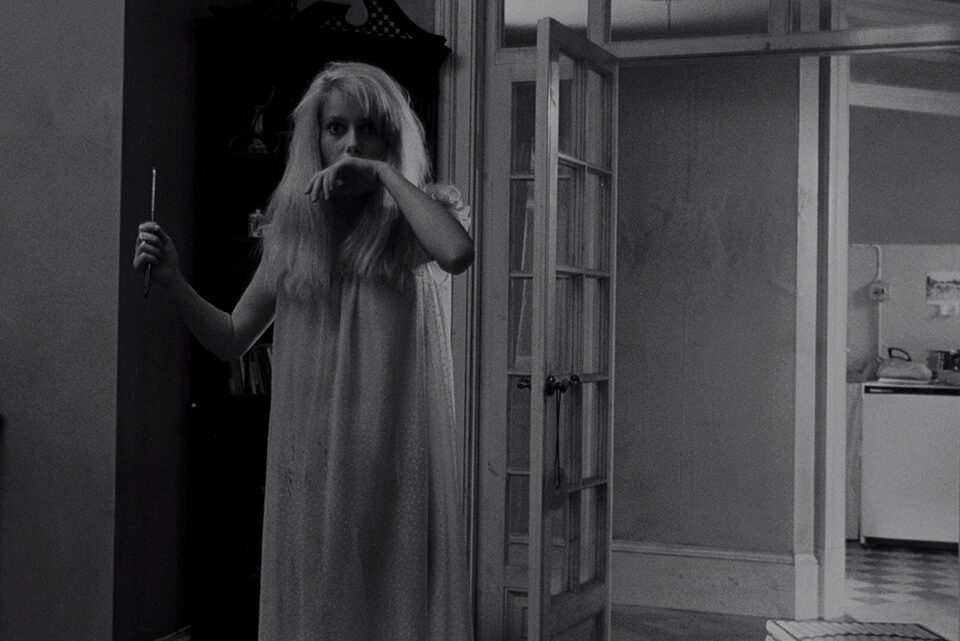
Repulsion
You were quite young when you met Kast, Varda, Demy, Chabrol…
The meeting with Chabrol was not a big deal. I’ll tell you what happened. He wanted to make a short film with Stéphane Audran in that part. He was determined to have a pregnant woman play the wife of Francis Blanche in The Beautiful Swindlers [Les Plus belles escroqueries du monde, 64]. Stéphane gave birth a week earlier than expected. I was pregnant at the same time and I gave birth a week after her, so I was almost nine months pregnant when we shot the film. It was only for two days.
Surrounded by all those people—I’m also thinking about Polanski or Rappeneau—didn’t cinema seem like a battlefield for the war between the Ancient and the Modern?
No, I had no sense that all that was going on, because my life was very separate from that environment. I have always kept my love life very private—to the best of my ability—and I have always chosen the films I wanted to make. Those were two separate worlds that never mixed. Ultimately, the film scene was not at all part of my life.
Did the experience of making Repulsion [65] in London with Polanski during the pop revolution have a stronger effect on you than the war of the Moderns, in France?
It’s funny because three of us were French: Roman, who, despite being Polish, spoke French all the time, Gérard Brach, and me. We really were the Three Musketeers. Everybody else on set was British. Roman knew exactly how to be respected by the crew, he was no pushover. But because we spoke French, we experienced the making of that film a little from the sidelines, in a rather unique atmosphere. We were a core within the team.
Like the film you made with Demy, Repulsion demands a closeness between the director and the actor.
Yes, I felt very, very close to Roman. That’s the film I feel I helped make. The producers were used to producing porn. It was a small budget film and for them, nothing of great consequence… The experience with Roman was very important to me.
It’s a frightening role. When I think of some of your other roles in Belle de Jour [67], Tristana [70], Liza [72]… You have to be brave to go there! If we look at your career—
For me, there is no such thing as “a career.”
Another actor would have accepted these roles because they are scandalous.
Oh no, not for me, not at all…
But what strikes me in your performance is that you take on the role because you believe that it is perhaps not that scandalous after all. Or that scandal is also an inherent part of life.
Yes, absolutely, it’s true! It seemed interesting and normal to me. I remember meeting a journalist in Los Angeles, when Téchiné’s Thieves [96] came out, who said to me “You don’t know how lucky you actresses are in Europe. An American actress could never agree to play a lesbian in a film, after a certain age and at a certain point in her life or career. It’s too risky.” I admit that I have always zigzagged. You know, it really depends on what films are being offered to you. It’s not always that interesting. Maybe people are more accepting of my choices, whereas for somebody else they would say, “How strange that she did that.” The door that opened to me after Belle de Jour was such that a lot of things could pass through it. Belle de Jour is a film that got bigger with time. It did well when it was released, but only later did it become a mythical, almost cult film. And that character became something of a symbol, a strange heroine. And because I played her, people made assumptions about me.
I confess that I prefer Tristana…
I definitely prefer Tristana to Belle de Jour!
You play Tristana in the same way you play Marie in A Matter of Resistance [La Vie de château, 66]… No, I’m expressing myself poorly… Both characters are very different, but you don’t fall into the “gothic” trap with the first one. On the other hand, you highlight the fantastical side of the second. And both characters share the eloquence of your point of view on life, or on fiction. I referred to this earlier as the mark of the auteur.
Maybe it’s an inability to do otherwise. Perhaps it’s a choice that isn’t really a choice. Perhaps it’s an impossibility to do anything else.
But your performance as Tristana is stupendous. The leaps that the character makes from grief to innocence to joy to despair. And then bitterness. It’s quite a journey.
Yes, the experience of making that film was rather unique. And it’s rare to play a character that goes through so many emotional states.
In the diary you kept on the set of Tristana, you write that the first scenes you shot were the scenes of her bitterness, set in the hallway. You picked out your own costume and did your own make-up. Whilst Buñuel is somewhere else, shooting another scene, you give yourself a ghostly face…
I had mentioned to Buñuel the evil queen in Snow White! With Buñuel, the experience was unique, because he was very modest and he liked to joke about things. Truffaut was the same. When we were filming, he never spoke to me in a straightforward way.
You mention that during the filming of the balcony scene, Buñuel said, “no psychology.” That scene has made history! Because of that scene Hitchcock sent Buñuel a note telling him of his admiration, saying he was jealous of such a shot. A scene that scabrous, that shocking, cannot be explained through psychology.
Sometimes you have to accept that the image is more powerful than you, that the director’s intentions are stronger than you. That’s why the performance was all about being extremely permeable, open, with nothing at the back of your mind. When he told me, “You smile,” the idea was to be as unmoved as possible, whilst smiling, and to stay clear of putting intention behind it. There was enough intention there in the first place! At the same time, Buñuel was extremely modest. Even with the actors it seemed… I felt for him. It was obvious that it wasn’t his favorite stage of the filmmaking process. It was something he had to go through: for the film to exist you need actors to play parts. But what he said was very minimal. It’s more what he said outside the film or what was written. But you really had to try and imagine, or guess, what he might have to say. He was very coarse in his way of talking. Actually, it made me laugh.
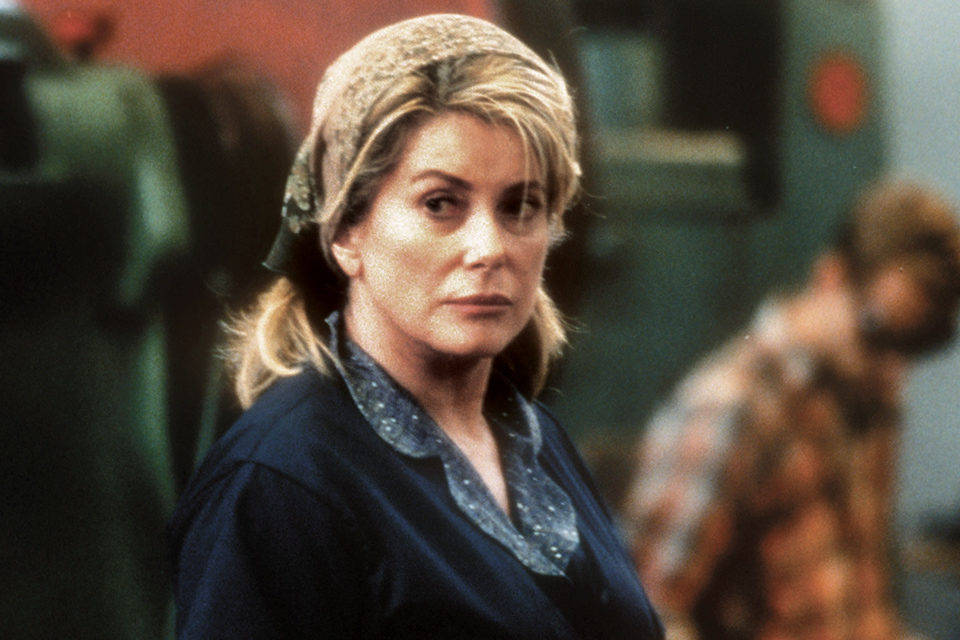
Dancer in the Dark
You’ve worked with a number of directors who were much older than you—Buñuel, Melville, Oliveira. However, scanning your career, I don’t ever get the sense that there were filial relationships, but that it was more of fraternal.
I think that comes from my masculine side.
I am also thinking of a moment in Dancer in the Dark. Your character is sulking in a corner of the theater and you say, “I don’t want to play the dog.” But you start barking anyway. You’re sulking, but you do it anyway. It’s not about submission, but about dialogue.
It would be hard to explain exactly what happened at that moment. Because in truth, I wasn’t supposed to bark. It’s also true that I remembered I had done the same thing for Liza. I’m the one who is barking when we recorded the sound loop. I played the dog. I had said to Ferreri, “Since I’m playing the bitch, I’ll also play the dog!” And so I had recorded the dog barking as well. By the way, I was pregnant with Chiara when I made that movie… I don’t know what happened with Lars von Trier. There must have been something, a little brazenness… And I am not a very brazen girl. I think you need a lot of trust to be able to do that. You have to be able to think, “I know subconsciously that if it doesn’t work, he won’t put it in.” What scares me the most when I am with a director and it doesn’t feel good, is when I think, “They have no point of view, they don’t know exactly what they’re doing, they won’t be able to judge…” I cannot give myself entirely because I know there’s no one there to catch me. Therefore, whatever I do will be in there. For me, that is the worst. Not trusting, being suspicious. I hold back, when really I want to be giving myself when I’m filming. But it is true that to give myself I need a lot of trust. And that has nothing to do with age or experience. It’s all about intuition.
Or you need to have enough good taste for two.
If I realize that the director and I don’t have the same taste, then I crawl back into my shell. It’s a terrible thing. That’s the danger for actors, generally speaking. The biggest danger is fear, or lack of trust. Without trust you can’t throw yourself in certain directions. I think it’s more the case with actors than for actresses.
Film Comment is an American magazine, so I should really be asking you questions about method, the invention of such or such character, how you found a certain gesture. But you once gave an answer that moved me a lot: “My relationship to character is made up of mental things that you should not put words to. To do so would be immodest. The most decisive moment of my work around a character happens as we are shooting. That moment is so tense, so exhausting that once it is over, I need fire doors between the set and me. Back in my dressing room or in the hotel, I shut myself off, because the state I am in on set is too exhausting.”
It’s true that when we are filming, I can concentrate very quickly, but it does tire me out. It throws me into such a state! A trance-like state. So, what I need is either a trick for a calm type of trance or a sleepwalking trick…
Emmanuelle Devos told me once that people often ask: how do you fabricate a character? When, of course, there is a whole preparation beforehand…
Not for me.
But in the end, what lasts, what the audience will see, is the five percent that’s left. That five percent is what happens during the take. And the time of a take is absolute.
There is no doubt that some things start happening before: some are subconscious, others are conscious. In my case, it happens in flashes. I am incapable of working by myself without a director, without someone to coach me. But that doesn’t tally at all with my idea of what a film character should be. I have to soak in what will happen on set, that day, the location, the light… I need to know what happens before in the story. To me that is the most important thing: to relate to a character in relation to where we are in the film. Maybe it also has to do with the fact that I have never done any real character parts. Even with Tristana, which required a bit of character acting. But Buñuel and I would talk off set, we had dinner together. The same is true of André Téchiné. We meet up but we always wind up talking about something else. And even though we have ended up talking about something unrelated, something useful has still come out of it. We have a conversation about something else but at the same time we are aware of what surrounds us, why we are here—the questions are very present in our head. But it is never straightforward. No, it is never straightforward.
Okay, now I’m going to take a detour: one day, I realized that the hatred of kitsch is a trend in modern cinema. For the audience, kitsch can be okay…
Yes, but not for you!
It’s so much nicer when it’s leaner. So, here are three anti-kitsch principles: the first, speed. “Deneuve plays too fast. Truffaut speaks too fast. Godard edits too fast.” Great! You can never be fast enough.
Téchiné too. Nowadays it’s crazy! Sometimes I tell him, “You’re not giving us enough time to understand!” He talks fast enough as it is. But he can hardly stand the silences between lines. He wants everything to be very fast. It’s a heightened urgency that has become more accentuated in his work. I do tell him!
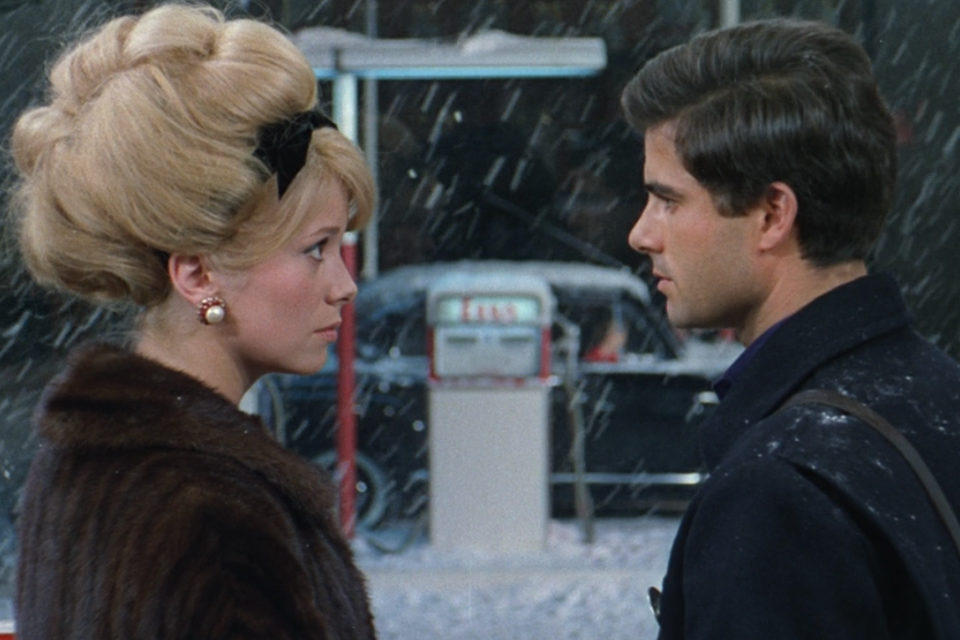
The Umbrellas of Cherbourg
Another film that refuses to give in to kitsch is Umbrellas. Demy prefers what is trivial to the heroic pose. Geneviève doesn’t need to be an abstract character or a victim to be fascinating.
Yes, absolutely!
A third principle now. I heard a program about Truffaut on the radio this summer. He was talking about scripts. He was irritated by an opening scene. “A man walks down the street, in a hurry.” Yes, but how do we know he’s in a hurry? And why is he in a hurry? Does he need to go to the bathroom? Is he falling into a deep dementia? Or is he being chased by the mafia? The risk there is acting out the words “in a hurry,” when it’s really about playing the scene. And what the audience will make of it.
Yes! Of course! It’s true that I would rather be in the situation than in the “sentence,” or in the “words.” It’s the situation that transports me.
When I watch you act I feel like you are telling us something. And that something moves me. In your film diaries, once when you got annoyed working with Stuart Rosenberg [on The April Fools, 69], you wrote, “His suggestive camera pisses me off.”
Stuart was adorable, but he was very passive. Not even slow. Passivity is terrible. I liked him. But it isn’t conducive, it makes for a heavy atmosphere. I was suffering a little. So, to add intensity! At the same time I adored Jack Lemmon, who was such a light actor, so wonderful. But he was going through a hard time in his life…
A role that I love, that is quite scandalous, is in Robert Aldrich’s film Hustle [75]…
Oh yes, with Burt Reynolds. They had warned me against the director, “He’s a misogynist! He’s very hard on actresses.” It’s the first time I was on a set where there were two cameras rolling continuously. I had spoken to Aldrich and said, “But, if this camera position is good for the wide shot, how can it also be good for the close-up?” We got on well. But I do remember thinking, “One of the two can’t be in the right place, obviously! You can’t have one good position for two different shots.” What he wanted to capture each time was the intensity. It’s true that often, when you try and use the close ups after, it looks awful.
Continuity scares me. I love the jump cuts in silent cinema.
Silent film is something else altogether.
I love seeing a wide shot of Lillian Gish, in the midst of a poised despair. Then, as the camera gets closer, the despair becomes more extreme. Or the opposite: the wide shot with her wringing her hands, then back to her face, impassive.
It’s funny because I did an interview not that long ago, in which I said that I would love to make a silent film. But it would have to be modern. A short, modern, silent film. I think I would really enjoy that exercise.
Téchiné films with two cameras. But it seems to me he is seeking discontinuity first and foremost.
Absolutely. He started to change his way of filming on My Favorite Season [93], where he used two cameras. He wanted to shoot both actors at the same time. He even did very long sequence shots on a dolly. You can see the cameras crossing each other in the shot. Then he has to cut it. But it’s very confusing for everyone to shoot that way. It’s complicated for the camera operator. It changes so many things. That’s how he started out. Then, when we did Thieves, he wanted to film close-ups of the two actors simultaneously. Then when he met Julien Hirsch, when we made Changing Times [04], he moved on to something else altogether.
What about Michael Mann; does he look for continuity or discontinuity? He has cameras everywhere.
I watched Miami Vice again. I hadn’t really liked it the first time round. But even so, it’s a whole other way of filming, it’s fascinating. There is a force, an incredible energy to it. His films are very long, but there are no gratuitous shots. When he decides to film the nape of an actor’s neck, there is a real tension. It’s there, it’s not at all . . . an effect. It’s surprising. He makes you feel the weight of things.
Earlier you mentioned sleepwalking. I found a quote from Truffaut about you: “Catherine is a ‘slowed down actress,’ she is rather slow.”
Really?!
Yes. “Actresses who attain mythical status are a little slower than others.” It made me think of those words you used: trance and sleepwalking.
Yes, perhaps. It’s true. It is still dumbfounding, though. What is annoying is when you have to play something anodyne. Sometimes I watch action movies and I think to myself, “My God they must have gotten so bored! How many times did they have to do that?” I find that terrible. You have to do this, you have to see this, then you have to get into a car… it’s mostly true of action movies.
Yes, but the car, the looks, the boredom… that’s exactly Stewart in Vertigo! You met Hitchcock. You had a project with him…
Yes, I was supposed to make a film with Hitchcock. It was set up North too, just like the Torn Curtain. It was going to be a spy story. At the time it was still only a synopsis. I had lunch with him in Paris and he died some months later. I would have loved to work with him.
He films those mundane things, but you still feel the tension. With him, the actor is fully aware that he is being filmed. Like in an Oliveira film!
Yes, but in those films it’s very funny. Truffaut had that too, from time to time. That clever and astute way of knowing that some things need to be shot a certain way. He had learned that from Hitchcock, from observing him and from doing that book with him. An inimitable way of filming. François spoke freely of what he did and how he filmed things. Heart to heart: it had to be a private conversation, never a public discussion.
Did you talk to Truffaut and Belmondo a lot on the set of Mississippi Mermaid [69]?
It was a very unique shoot. He was writing the dialogue as we worked. They would slide next day’s scenes under the hotel room door, in the night.
In the script and in his own copy of the book, Truffaut underlined all the clues that help us to understand what stage the couple is at, physically. It’s both very suggestive and very crude.
Yes, I agree. It’s a very immodest film. At times it was difficult for me. But, yes, those moments are precise: if she feels that he is suspicious, or if even if things have gone well and she feels that she can abuse his trust… Yes it is crude. But her relationship with Belmondo is a difficult one.
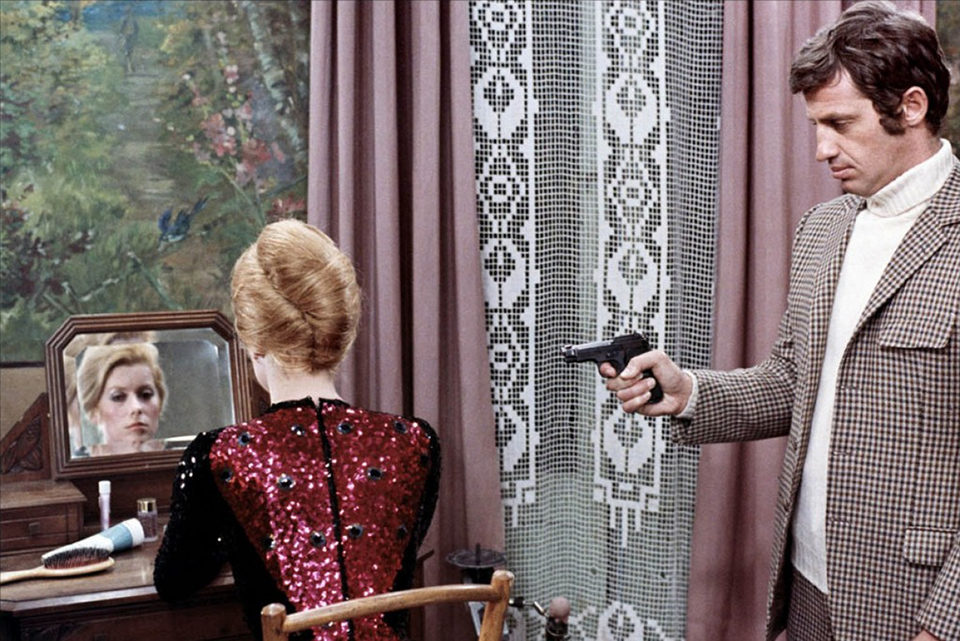
Mississippi Mermaid
He is wonderful in the film, but French audiences do not like to see a man playing a feminine part.
Especially not Jean-Paul Belmondo! Even he himself… That was the thing. He wanted to work with François, but I think he realized that it was more a film for me than for him. Plus, he was engaged to an actress and that didn’t make things any easier. There was a real clash. He stopped filming. We were shooting a difficult scene and he didn’t like it. François said, “We’ll rehearse it some more.” And Jean-Paul must have thought that it was too late, that it was time for lunch, so he left. François was a little surprised and then he said, “Right… we won’t shoot. We won’t shoot today.” He and I had lunch together in Marseilles. When Jean-Paul came back an hour and a half later and found nobody there, it was a terrible catastrophe. I think that for François, it had been a mixture of factors. He couldn’t feel that scene and Jean-Paul’s attitude had fed into that. I remember, I was in such a state! I though it was folly, I was in such a panic. Especially because I was spending a lot of time with François, talking, and I knew that was a problem for Jean-Paul from the start…
The ending in the snow was more or less improvised, wasn’t it?
He really wanted it to be like a cartoon. When we got to Grenoble, he wanted the end to be… That’s when I was the evil queen, the one who poisons Snow White.
What about Hitchcock, which one of your films made him want to meet you?
That was through François. Because they used to see each other when Hitchcock came to Paris, we had met…
And you never met Renoir?
No.
Are there any films by Renoir that meant a lot to you?
Oh yes. The River.
Didn’t Demy know Renoir?
No, When Jacques was in Los Angeles, shooting Model Shop, we sometimes had lunch at Cukor’s, but never with Renoir. He was probably already very tired. Which reminds me, I saw The Women. It’s good, but what cruelty! Cukor did not really like women…
I love Rich and Famous.
Oh yes, Jacqueline Bisset and Candice Bergen. It was good…
Your favorite Godard film? Among the recent ones…
No, not among the recent ones. When I hear the words from his recent films, I think they are absolutely wonderful. I am incredibly moved. But when I watch them, I can’t really relate to them. From Godard’s films, I would probably say Pierrot le Fou. But I don’t know Godard’s films well enough.
A favorite Scorsese film?
Mmmm. No, not The Age of Innocence. Casino is truly brilliant. Ah, I know: Raging Bull!
Obviously, because you’re a girl and you love to identify with Jake La Motta…
It’s mostly because of De Niro. To watch an actor become that for a film, to watch him achieve being filmed like that by his director, I find it… The only thing that annoys me a bit about Scorsese’s films are the women. I find them a little trampled.
Alice Doesn’t Live Here Anymore is wonderful!
Oh yes, but Ellen Burstyn is a wonderful actress. Otherwise, he’s not that interested in women, is he?
The Last Metro
I get the impression that The Last Metro [80] was more formative, had more of an effect on you than Mississippi Mermaid.
Yes, you’re right. Mississippi Mermaid was much more complicated. But The Last Metro was very different. For starters, we spoke a lot, we spent a lot of time together. He would never watch the rushes. He used to say, “I’ll see them at the end of the week.” I used to watch them. He would ask me to tell him what I’d seen. We talked a lot about cinema, actors… That was his passion. Films, of course, but mainly actors and actresses. And because he was so passionate about it, you couldn’t help yourself listen to him. He and I talked a lot back then.
In the piece that Truffaut wrote about you, he said: “Catherine isn’t a flower. A woman, a flower, those are silly. Even less a bouquet. Catherine is a vase, in which the audience places the bouquet.” You yourself described the work you do as being a blank page upon which the film is written.
François’ idea of the vase is very true. The blank page… Yes, it’s true, I do prefer to start without any intention at all, rather than arrive with my own idea. I am incapable of deciding what a character is. At the same time, from the moment I have accepted the part and read the script, I know that things will circle in my mind. It won’t happen all the time but nor will it ever stop entirely. But I am not obsessed, I don’t have any trouble getting out of character, at night. I am always happy when filming and I am always happy to leave at night—it’s true that there is always a kind of a nervous fatigue. Which I know is hidden away somewhere during the shoot. There are some things that fall into place without me doing anything. I know that now.
Right, I am going to start a silly game with you. It’s a quiz. But I don’t want to bother you…
No, go on!
Picasso or Matisse?
I would say Picasso.
Rolling Stones or Beatles?
Rolling Stones.
Town or country?
Town, but I like the country nonetheless.
Renoir or Bresson?
How cruel to be asking me this! I am going to say Bresson… No… Oh, Renoir, when I was younger! Now, I would probably say Bresson, I think.
Studio or location? I was very surprised to read that you like shooting in studios.
I do prefer natural landscapes. But on some films, the natural landscapes are so narrow, the noise is so loud, the presence of the crew is so strong, that it’s very hard to find intimacy.
Flaubert or Stendhal?
Stendhal.
Pollock or Warhol?
Pollock.
Beethoven or Mozart?
Oh dear… You see, I could draw a line down the middle and say: that’s my night, that’s my day… I will say Mozart because I want to stop crying.
Shakespeare or Molière?
Well, Shakespeare, yes.
That question was too easy. Shakespeare or Strindberg?
That’s a hard one! I will still say Shakespeare.
Too easy. Strindberg or Chekhov? Now I’m being a bastard.
Oh, I love both their worlds so much! I can’t choose.
I have a solution: Nicolas Ray or Téchiné?
[laughing, she chants]: Téchiné! Téchiné!
You are, of course, linked to what I would call the New French Realism: Téchiné, Garrel, the missed opportunity with Pialat…
Oh, that missed opportunity! What a shame…
Nonetheless, there is a quote by Godard that I like a lot because it touches upon something you share with the New Wave. Godard said that he preferred to ”imprint an expression” rather than “express an impression.” That is similar to your idea of the blank page.
Yes, it’s very beautiful. That’s exactly what it is.
I find that, when you are acting, before expressing your impressions, which is valuable and is without a doubt one of the actor’s tasks, first you imprint an expression. You imprint it onto the screen. That’s what I find so unique about you. So I end my quiz: Stanislavsky or Brecht?
Oh, Brecht! But then again, when I think of some of my characters’ situations… I’ve been blind, dumb, amputated, and a killer, a vampire, a mother, a teen mother, a lesbian, an alcoholic, and a thief…
So what about the very reserved, bourgeois actress?!
It’s unbelievable! I am shocked when people talk about me and sum me up as: blonde, cold, and solemn. People will cling on to whatever reinforces their own assumptions about a person.
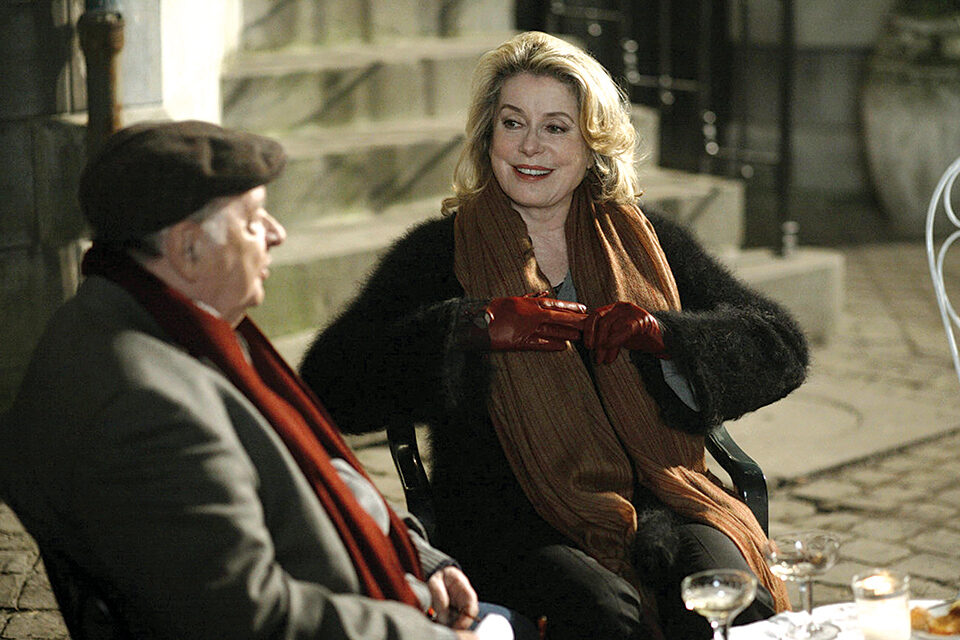
A Christmas Tale
It strikes me just as much in Truffaut. He was the only one in the gang who really used to be a bad boy, yet we watch his films as though they were genteel. What I love about him is his tendency toward the extreme. With you too, there is a naughty side that comes out in your choice of roles and the way you play them. You must know that when you accept a certain role, people will be shocked, that there is a transgression…
I never think of the audience until the film is made! Even after it is made, I always hope that the film and the audience will meet in the middle, but if people don’t like it, even though it bothers me, it doesn’t interfere with the pleasure I had making it. I think I have different audiences. The number of people who speak to me about A Christmas Tale… People who would perhaps never have dared to speak to me before. It’s very strange. I can be sat there for an hour next to someone and just before leaving they say something they were dying to tell me. This is one of the films people have spoken to me about the most. There is something jubilatory about the character that people really like. That scene with Amalric in the garden had people transfixed. It is both insolent and truthful, and what they are saying is in very bad taste—because those are not the kind of words that should be spoken between a mother and son—and it moves them. It’s very strange. People often say, “I loved your last film, it was wonderful…” But in this case, there is that jubilatory aspect of her character.
It’s the Actor-Liberation-Front. When both characters and actors are conscious of what they are and what they are saying on the screen. Whereas usually, the character is an idiot, the actor an animal and the director manipulates them both.
Yes!
I forgot to ask you some questions. May I?
Yes, go on!
You can’t have met Bazin since you weren’t part of the same gang…
No. François spoke about him. A lot.
Which American actors had an effect on you. Cooper?
Yes, but at the same time, strangely enough, I found them very asexual. Very sexy and very asexual. Actors came later for me. James Dean, yes, I found him very touching, different, surprising. They came later for me: Pacino, De Niro. Those two in particular. But there are many other American actors that I love. I find it much easier to think of the names of American actors than I do of European ones, frankly. Apart from the British. I love British actors.
Really? Who?
They’re all dead: Lawrence Harvey, Tom Courtenay, Peter Finch . . . and Albert Finney, who nowadays reminds me so much of Chiara’s father, physically. It’s uncanny how much he reminds me of Marcello…
You once said something about Mastroianni that I love. You said that in the cinema, unlike in the theater, there are no men and women, only boys and girls.
Well it’s true!
I conclude with Truffaut and another extract from the same text. “If humanity is divided between exhibitionists and voyeurs, Catherine is a voyeur, therefore closer to life.” I find it delightful.



